Texas's 21st congressional district
Texas's 21st congressional district of the United States House of Representatives serves the area north of San Antonio and a significant portion of Austin in the state of Texas. The current Representative from the 21st district is Chip Roy.
| Texas's 21st congressional district | |||
|---|---|---|---|
.tif.png.webp) Texas's 21st congressional district since January 3, 2013 | |||
| Representative |
| ||
| Distribution |
| ||
| Population (2019) | 829,628[2] | ||
| Median household income | $73,472[2] | ||
| Ethnicity |
| ||
| Cook PVI | R+10[3] | ||
Demographics
According to the APM Research Lab's Voter Profile Tools[4] (featuring the U.S. Census Bureau's 2019 American Community Survey), the district contained about 628,000 potential voters (citizens, age 18+). Of these, 65% are White and 26% are Latino. Immigrants make up 4% of the district's potential voters. Median income among households (with one or more potential voter) in the district is about $75,100, while 9% of households live below the poverty line. As for the educational attainment of potential voters in the district, 44% hold a bachelor's or higher degree.
Election results from statewide races
| Year | U.S. President | U.S. Senator | Governor |
|---|---|---|---|
| 2004 | Bush (R) 66 – 34% | — | — |
| 2008 | McCain (R): 56 – 42% | [Data unknown/missing] | — |
| 2012 | Romney (R): 59.8 – 37.9% | Cruz (R): 58 – 37% | — |
| 2016 | Trump (R): 52.5 – 42.5% | — | — |
| 2018 | — | Cruz (R): 49.6 – 49.5% | Abbott (R): 55 – 43% |
| 2020 | Trump (R): 51 – 48% | — | — |
List of members representing the district
| Member | Party | Years | Cong ress |
Electoral history |
|---|---|---|---|---|
| District created January 3, 1935 | ||||
| Charles L. South | Democratic | January 3, 1935 – January 3, 1943 |
74th 75th 76th 77th |
[data unknown/missing] |
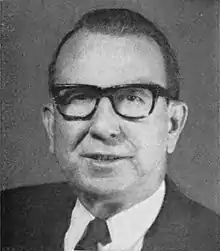 O. C. Fisher |
Democratic | January 3, 1943 – December 31, 1974 |
78th 79th 80th 81st 82nd 83rd 84th 85th 86th 87th 88th 89th 90th 91st 92nd 93rd |
[data unknown/missing] Retired. |
| Vacant | December 31, 1974 – January 3, 1975 |
93rd | ||
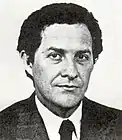 Bob Krueger |
Democratic | January 3, 1975 – January 3, 1979 |
94th 95th |
[data unknown/missing] |
 Tom Loeffler |
Republican | January 3, 1979 – January 3, 1987 |
96th 97th 98th 99th |
[data unknown/missing] |
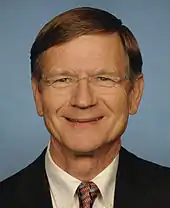 Lamar Smith |
Republican | January 3, 1987 – January 3, 2019 |
100th 101st 102nd 103rd 104th 105th 106th 107th 108th 109th 110th 111th 112th 113th 114th 115th |
[data unknown/missing] Retired. |
 Chip Roy |
Republican | January 3, 2019 – present |
116th 117th |
Elected in 2018. |
Recent election results
| Party | Candidate | Votes | % | ±% | |
|---|---|---|---|---|---|
| Republican | Lamar Smith | 209,774 | 61.5% | -11.4% | |
| Democratic | Rhett Smith | 121,129 | 35.5% | +10.2% | |
| Libertarian | Jason Pratt | 10,216 | 3.0% | +1.1% | |
| Majority | 88,645 | 26.0% | |||
| Turnout | 341,119 | ||||
| Republican hold | Swing | -10.8% | |||
2006
In the case of League of United Latin American Citizens v. Perry, 548 U. S. 399 (2006), the U.S. Supreme Court ruled that the configuration of Texas' 15th, 21st, 23rd, 25th and 28th congressional districts as drawn by the Texas Legislature violated the National Voting Rights Act of 1965. Replacement district boundaries for the 2006 election were subsequently issued for the five districts by the local federal district court, and on election day in November, these five districts had open primaries, with a candidate being elected if he or she received over 50 percent of the vote, and runoff elections in December to decide elections in which no candidate gained an absolute majority in November.[5]
In the 2006 election, Lamar Smith defeated veteran and college administrator John Courage with 60% of the vote.
| Party | Candidate | Votes | % | ±% | |
|---|---|---|---|---|---|
| Republican | Lamar Smith | 122,486 | 60.1% | -1.4% | |
| Democratic | John Courage | 49,957 | 24.51% | -10.99% | |
| Democratic | Gene Kelly | 18,355 | 9% | ||
| Independent | Tommy Ray Calvert Jr | 5,280 | 2.59% | ||
| Libertarian | James Arthur Strohm | 4,076 | 2.0% | -1.0% | |
| Independent | James Lyle Peterson | 2,189 | 1.07% | ||
| Independent | Mark J. Rossano | 1,439 | 0.7% | ||
| Majority | |||||
| Turnout | 203,782 | ||||
| Republican hold | Swing | ||||
2008
| Party | Candidate | Votes | % | ±% | |
|---|---|---|---|---|---|
| Republican | Lamar Smith | 243,471 | 79.99% | +19.89% | |
| Libertarian | James Arthur Strohm | 60,879 | 20% | +18% | |
| Majority | 182,592 | ||||
| Turnout | 304,350 | ||||
| Republican hold | Swing | ||||
2010
In the 2010 election, Lamar Smith defeated Lainey Melnick with 68.9 percent of the vote. Melnick, an Austin real estate broker, officially filed papers with the Federal Election Commission on June 23, 2009 to become a candidate.
| Party | Candidate | Votes | % | ±% | |
|---|---|---|---|---|---|
| Republican | Lamar Smith | 169,924 | 68.9% | -11.09% | |
| Democratic | Lainey Melnick | 65,834 | 27.9% | +3.39% | |
| Libertarian | James Arthur Strohm | 7,687 | 3.3% | -16.7% | |
| Majority | 96929 | ||||
| Turnout | 236,284 | ||||
| Republican hold | Swing | ||||
2012
Incumbent Lamar Smith faced five challengers in the 2012 general election on November 6, 2012: Candace Duval (Dem), John-Henry Liberty (Lib), Fidel Castillo (Grn), Bill Stout (Grn), and Carlos Pena (Ind). [6]
| Party | Candidate | Votes | % | |
|---|---|---|---|---|
| Republican | Lamar Smith (Incumbent) | 187,015 | 60.55% | |
| Democratic | Candace E. Duval | 109,326 | 35.40% | |
| Libertarian | John-Henry Liberty | 12,524 | 4.05% | |
| Total votes | 308,865 | 100.0% | ||
2014
| Party | Candidate | Votes | % | |
|---|---|---|---|---|
| Republican | Lamar Smith (Incumbent) | 135,513 | 71.80% | |
| Libertarian | Ryan Shields | 25,483 | 13.50% | |
| Green | Antonio Diaz | 27,782 | 14.70% | |
| Total votes | 188,778 | 100.0% | ||
2016
| Party | Candidate | Votes | % | |
|---|---|---|---|---|
| Republican | Lamar Smith (Incumbent) | 202,523 | 57.00% | |
| Democratic | Tom Wakely | 129,253 | 36.40% | |
| Libertarian | Mark Loewe | 14,698 | 4.10% | |
| Green | Tony Diaz | 8,520 | 2.40% | |
| Total votes | 354,994 | 100.0% | ||
2018
Lamar Smith did not run for reelection in 2018.[7]
On the Republican side, 18 candidates competed in the March 6 primary, in which no one received a majority. The first- and second-place finishers were, respectively, attorney Chip Roy, who served as chief of staff to Sen. Ted Cruz (R-Tex.) and senior advisor to Texas Gov. Rick Perry (R),[8] and Matt McCall, owner of a business providing human tissue for American military hospitals. Roy and McCall advanced to a May 22 runoff, which Roy won with 52.7% of the vote.[9]
On the Democratic side, four candidates ran to replace Smith: Joseph Kopser, entrepreneur and Army veteran; Derrick Crowe, activist; Elliott McFadden, executive director of Austin B-cycle; and Mary Street Wilson, pastor.[10] No one received a majority in the March 6 primary,[11] so the top two finishers, Wilson and Kopser, advanced to a runoff on May 22. Kopser flipped the primary result in the runoff against Wilson, winning the nomination with 58% of the vote.[12]
| Party | Candidate | Votes | % | |
|---|---|---|---|---|
| Republican | Chip Roy | 176,913 | 50.3% | |
| Democratic | Joseph Kopser | 167,020 | 47.5% | |
| Libertarian | Lee Santos | 7,497 | 2.1% | |
| Total votes | 351,430 | 100.0% | ||
2020
The incumbent, Chip Roy, was unopposed for the Republican nomination. Former state Senator Wendy Davis won the Democratic primary runoff.[13] Tom Wakely was nominated by the Green Party caucus. The state Supreme Court insured his inclusion after Wendy Davis tried unsuccessfully to have him removed from the ballot.[14] Perennial candidate Arthur DiBianca is the Libertarian nominee,[15] but Roy joined a last-minute suit to strike his name and other similarly situated Libertarians from the ballot.[16]
Primary results
| Party | Candidate | Votes | % | |
|---|---|---|---|---|
| Democratic | Wendy Davis | 84,593 | 86.3 | |
| Democratic | Jennie Lou Leeder | 13,485 | 13.7 | |
| Total votes | 98,078 | 100.0 | ||
General election
| Party | Candidate | Votes | % | |
|---|---|---|---|---|
| Republican | Chip Roy (incumbent) | 235,740 | 52.0 | |
| Democratic | Wendy Davis | 205,780 | 45.3 | |
| Libertarian | Arthur DiBlanca | 8,666 | 1.9 | |
| Green | Tom Wakely | 3,564 | 0.8 | |
| Total votes | 453,750 | 100.0 | ||
| Republican hold | ||||
Historical district boundaries
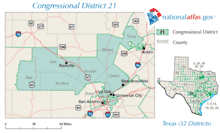
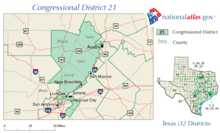
See also
References
- "Congressional Districts Relationship Files (State-based)". www.census.gov. Retrieved February 8, 2018.
- "My Congressional District". www.census.gov. Retrieved February 8, 2018.
- "Partisan Voting Index – Districts of the 115th Congress" (PDF). The Cook Political Report. April 7, 2017. Retrieved April 7, 2017.
- "Representing US: 2020 Voter Profiles". APM Research Lab. Retrieved 2020-10-22.
- Austin American-Statesman accessed 4 August 2006; link broken 18 October 2006
- "Texas' 21st Congressional District elections, 2012". ballotpedia.org. Retrieved September 14, 2012.
- Dixon, Darius (November 2, 2017). "Lamar Smith won't seek reelection to House". Politico. Retrieved January 30, 2018.
- Alberta, Tim (October 23, 2018). "Meet the Next Ted Cruz". Politico.
- Price, Asher (23 May 2018). "Joseph Kopser to face Chip Roy in 21st Congressional District matchup". Statesman. USA Today Network.
- "Who's on the Texas primary ballots in 2018?". apps.texastribune.org. January 24, 2018. Retrieved January 30, 2018.
- "Important 2018 Election dates". www.sos.state.tx.us. Retrieved January 30, 2018.
- "Texas Primary Runoff Election Results: 21st House District". The New York Times. May 29, 2018. Retrieved July 26, 2018.
- "The latest fundraising ahead of the next huge primary night". Politico. June 12, 2020. Retrieved August 28, 2020.
- Texas court allows Green Party candidates on the ballot , Express News, Gilbert Garcia, August 21, 2020. Retrieved August 28, 2020.
- Arthur DiBianca, Ballotpedia. Retrieved August 28, 2020,
- Republicans File Appeal to Texas Supreme Court to Remove Libertarian Candidates from Ballot, TheTexan, Brad Johnson, August 28, 2020. Retrieved August 28, 2020.
- "Texas Election Results - Official Results". Texas Secretary of State. Retrieved November 26, 2020.
- Martis, Kenneth C. (1989). The Historical Atlas of Political Parties in the United States Congress. New York: Macmillan Publishing Company.
- Martis, Kenneth C. (1982). The Historical Atlas of United States Congressional Districts. New York: Macmillan Publishing Company.
- Congressional Biographical Directory of the United States 1774–present